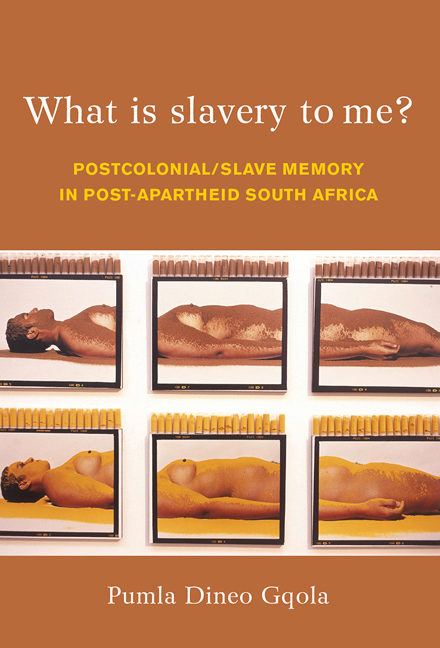Book contents
- Frontmatter
- Contents
- Dedication
- Acknowledgements
- Acronyms
- Introduction: Tracing (re)memory, thinking through echoes of colonial slavery in contemporary South Africa
- 1 Remembering differently: repositioned coloured identities in a democracy
- 2 (Not) Representing Sarah Bartmann
- 3 Whiteness remixed, or remembered impurity, shame and television
- 4 ‘As a slave you have to have faith or you'll give up’: Cape Malay/Muslim identity clusters in Cape Town
- 5 ‘Is the secret in cooking?’ Coded food, spice routes and processing Malay identities
- Conclusion: Unshackling memory, rememorying agency
- Endnotes
- References
- Index
3 - Whiteness remixed, or remembered impurity, shame and television
Published online by Cambridge University Press: 21 April 2018
- Frontmatter
- Contents
- Dedication
- Acknowledgements
- Acronyms
- Introduction: Tracing (re)memory, thinking through echoes of colonial slavery in contemporary South Africa
- 1 Remembering differently: repositioned coloured identities in a democracy
- 2 (Not) Representing Sarah Bartmann
- 3 Whiteness remixed, or remembered impurity, shame and television
- 4 ‘As a slave you have to have faith or you'll give up’: Cape Malay/Muslim identity clusters in Cape Town
- 5 ‘Is the secret in cooking?’ Coded food, spice routes and processing Malay identities
- Conclusion: Unshackling memory, rememorying agency
- Endnotes
- References
- Index
Summary
Shifts in identification that have been taking place under the sign of whiteness since the end of minority rule can be ascribed, in part, to the fact that previously sanctioned stagings of whiteness are increasingly registered as untenable in the everyday post-apartheid inter-racial encounter.
(Strauss 2006: 179)This chapter is concerned with what happens when a country's changing political landscape destabilises older claims to identity and power. In a newly democratic South Africa, not only is it noticeable that ‘whiteness just isn't what it used to be’, to borrow Melissa Steyn's (2001) title from her seminal study of South African whiteness post-apartheid, but the vocabulary for speaking about whiteness in relation to colonialism and slavery undergoes considerable revision. This is in line with Strauss's citation, on which I opened this chapter, which stresses the emergence of new forms of identifying and functioning as a white person in a changed political reality.
The meanings of whiteness in contemporary South Africa are a hotly debated issue within white society as well as from without. Various media platforms regularly give space to the contested meanings of whiteness: from invitations to inhabit different white subjectivities to claims to white marginalisation. While in the post-apartheid context ‘black and white are no longer synonymous with rich and poor’ (Nattrass & Seekings 2001: 47), due to some of the successes of legislatively enabling measures, it is widely accepted that B/black citizens are significantly more likely to be poor than white citizens (Kingdon & Knight 2004).
However, race is not only highlighted in the verifiable statistics of income. As Melissa Steyn (2001) relates in the preface to her study of the shifting experiences of whiteness in post-apartheid South Africa, it is important to pay attention to the changes and the continuities, as well as to probe emerging elusive meanings and expressions. This is the task of this chapter, which reads specific new ways of negotiating Afrikaner/white identities with reference to claimed slave ancestry.
- Type
- Chapter
- Information
- What is Slavery to Me?Postcolonial/Slave Memory In Post-Apartheid South Africa, pp. 105 - 132Publisher: Wits University PressPrint publication year: 2010



